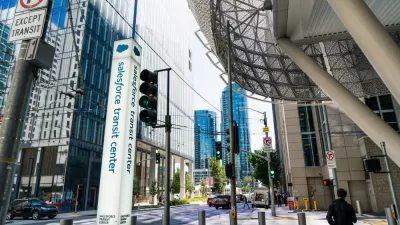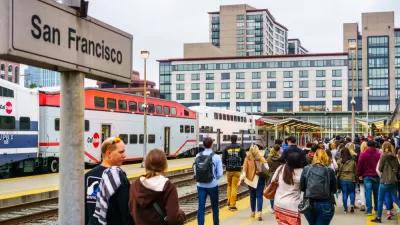Should a packed commuter train remove seats to make room for cyclists or charge to bring bikes on board during peak hours? The Caltrain line between San Francisco and Silicon Valley, the first to accommodate cyclists, is wrestling with this issue.
"'Leaving San Jose anytime between 5 and 7 (p.m.) is just nuts,' said Robert Cox, who rides the train there from his home in Redwood City. 'I've seen people get bumped a lot and it's just going to get worse.'
That's not news to Caltrain, which recently completed a report that recommends several possible solutions such as building more bike lockers at stations, starting a bike sharing program or charging a fee for allowing bikes during peak ridership hours.
But bikers, who now make up an estimated 8 percent of Caltrain's weekday riders, say the report misses the point, and that the train services should free up some space for their bikes either by removing more seats or adding more train cars."
"Caltrain's Bicycle Parking and Access Plan, released last week, gives a broad look at issues bicyclists face when using Caltrain.
It was initially called the Bicycle Master Plan, but cyclists complained that it focused on parking and access at Caltrain stations and ignored the 80 percent of cyclists who carry their bikes on the train. So the name was changed, but bikers say the focus didn't change much."
"The (San Francisco Bicycle) coalition crafted its own bicycle plan, which it distributed to Caltrain board members at a recent meeting. (Andy) Thornley, (program director) said he hopes officials will consider their suggestions, including taking out more seats".
Caltrain: Bike Plan Available for Review
Planetizen: Bikes on Trains: The Downside Of A Popular Program
SF Bicycle Coalition: Caltrain and Bikes - Have you been left behind?
FULL STORY: Riders say bike plan falls short

Planetizen Federal Action Tracker
A weekly monitor of how Trump’s orders and actions are impacting planners and planning in America.

Maui's Vacation Rental Debate Turns Ugly
Verbal attacks, misinformation campaigns and fistfights plague a high-stakes debate to convert thousands of vacation rentals into long-term housing.

San Francisco Suspends Traffic Calming Amidst Record Deaths
Citing “a challenging fiscal landscape,” the city will cease the program on the heels of 42 traffic deaths, including 24 pedestrians.

Defunct Pittsburgh Power Plant to Become Residential Tower
A decommissioned steam heat plant will be redeveloped into almost 100 affordable housing units.

Trump Prompts Restructuring of Transportation Research Board in “Unprecedented Overreach”
The TRB has eliminated more than half of its committees including those focused on climate, equity, and cities.

Amtrak Rolls Out New Orleans to Alabama “Mardi Gras” Train
The new service will operate morning and evening departures between Mobile and New Orleans.
Urban Design for Planners 1: Software Tools
This six-course series explores essential urban design concepts using open source software and equips planners with the tools they need to participate fully in the urban design process.
Planning for Universal Design
Learn the tools for implementing Universal Design in planning regulations.
Heyer Gruel & Associates PA
JM Goldson LLC
Custer County Colorado
City of Camden Redevelopment Agency
City of Astoria
Transportation Research & Education Center (TREC) at Portland State University
Jefferson Parish Government
Camden Redevelopment Agency
City of Claremont





























